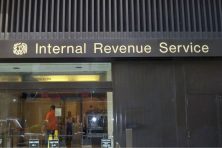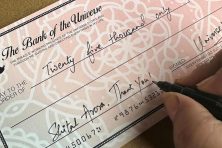What’s Taxable And What’s Not? 15 IRS Rules You Shouldn’t Ignore

You might think you know what counts as income, but the IRS has a few twists up its sleeve. Between casual cash jobs and canceled debt, the line between taxable and not can get blurry. Here’s what you’ll want to double-check before filing.
1. Gifts Aren’t Income Unless You’re The Giver

Receiving a generous cash gift? The IRS won’t tax you for it. It’s the giver who needs to worry about filing Form 709 if the gift exceeds $18,000 per person in 2024. As the recipient, you won’t owe anything unless that “gift” was secretly a payment.
Make money easier. Sign up for The Penny Hoarder’s newsletter today.
2. Your Weekend Gig Counts As Taxable Work

The $600 threshold for 1099-Ks isn’t fully active yet, but don’t assume you’re in the clear. Venmo, PayPal, or Zelle income still matters. Some states have stricter rules, and you don’t want surprises come tax season. Keep a record, as it’s easier than scrambling later.
More From The Penny Hoarder: 17 Make-Your-Own-Schedule Jobs You Can Do From Home
3. Not Every Scholarship Dollar Is Off The Hook

Scholarships used for tuition fees or required books are tax-free. Coverage for accommodation or travel, however, gets taxed like regular income. That means if your award covers your dorm and meal plan, you’ll need to report that chunk when tax season rolls around.
More From The Penny Hoarder: The 28 Best Side Hustles: Our Top Picks to Help You Make More Money
4. Selling Random Stuff Isn’t Always A Business

If you’re unloading personal items like old clothes or tech, those aren’t taxable, provided you sold them for less than you paid. It turns taxable if you regularly resell for profit or treat it like a business. The IRS looks at patterns, not just prices.
More From The Penny Hoarder: 6 Free Budgeting Templates To Help You Save In 2025
5. Bartering Isn’t A Free Pass

Trading your graphic design for a haircut feels casual, but both sides owe taxes on what they received. The value of that service swap is treated like income, even if no money changed hands. Self-employed folks should especially track these trades throughout the year.
More From The Penny Hoarder: Free Baby Stuff for Expecting Mothers in 2025 (38 Freebies & Deals!)
6. Credit Card Points Usually Stay Off The Tax Radar

When rewards come as a percentage of spending, like 2% cash back or points from purchases, they’re not taxed. Those are viewed as rebates. Trouble starts if you receive a bonus simply for opening the card without meeting a spending requirement. That’s when the IRS steps in.
More From The Penny Hoarder: The 5 Top Apps for Saving Money in 2025
7. Found Money? The Irs Calls It Income

Stumbled upon a $500 check you forgot about or got a surprise payout from a class action lawsuit? That’s considered taxable income. Even gambling winnings, no matter how small, go on your return. The IRS doesn’t ignore unexpected cash, and neither should you.
More From The Penny Hoarder: 8 Ways Savvy Shoppers Are Outsmarting Inflation at the Grocery Store
8. Life Insurance Payouts Usually Skip Taxes

If you’re the beneficiary on a life insurance policy, that lump sum is typically tax-free. Things shift if you receive interest on delayed payments or if the policy was transferred to someone else before death. Then, parts of it might be taxable under specific rules.
More From The Penny Hoarder: What is Debt Settlement and How Does it Work?
9. Court Settlements Could Be Taxable

Money from personal injury cases for physical harm is generally exempt from tax. However, emotional distress payouts or punitive damages are usually counted as taxable income. It all depends on why the money was awarded, so reviewing your settlement’s breakdown is key.
More From The Penny Hoarder: What is Debt Consolidation — And Should I Consider It?
10. Employer Gifts Aren’t Always Gifts

That holiday bonus or gift card from your boss isn’t just festive cheer, it’s taxable compensation. The IRS sees anything with clear monetary value as income. Non-cash gifts under $25, like a turkey or fruit basket, might pass, but anything spendable needs to hit your W-2.
More From The Penny Hoarder: How to Pay off Credit Card Debt in 2025
11. Crowdfunding Isn’t Always “Free” Money

Raising cash through GoFundMe or Kickstarter? If it’s truly a gift, it may not be taxed. But the moment you offer perks or services in return, it’s treated as business income. The IRS reviews intent and benefits exchanged, not just your platform of choice.
More From The Penny Hoarder: Our Picks for The Best Budget Apps for Couples
12. Health Savings Account Withdrawals Stay Tax-Free If Spent Right

Using HSA funds for approved medical expenses is completely tax-free. However, take that same money for something unrelated before turning 65, and you’re facing income tax plus a 20% penalty. The benefits are strong, but only if you stick to health-related spending.
More From The Penny Hoarder: Budgeting 101: How to Budget Money
13. Debt Forgiveness Can Trigger A Tax Bill

If a lender cancels your debt, you might owe tax on the forgiven amount. This includes settled credit cards, unpaid loans or foreclosure differences. Exceptions apply, like for bankruptcy or qualifying mortgage relief, but in most cases, canceled debt is treated like income you “kept.”
More From The Penny Hoarder: Our Picks for The Best Savings Accounts for This Month
14. Unemployment Benefits Don’t Fly Under The Radar

During tough times, unemployment checks help, but they still count as income. The federal tax applies, and some states take a bite, too. So, you can request withholdings upfront to avoid a big surprise in April. Skipping this step can also lead to underpayment penalties or refund delays.
More From The Penny Hoarder: Our Picks for The Best Bank Promotions This Month
15. Rental Income Isn’t Just For Landlords

Income from hosting guests, whether in your basement or on Airbnb, is taxable, even for short stays. That includes cleaning fees and extra guest charges. But there’s a catch: rent out your home fewer than 15 days a year, and you may owe nothing.
More From The Penny Hoarder: The Best Travel Credit Cards of 2025












